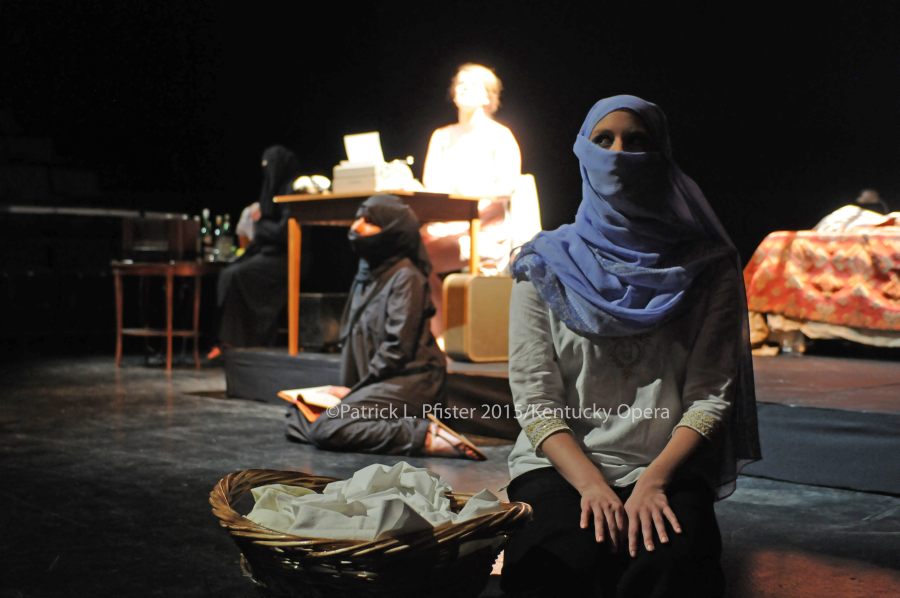Approaching brand new operatic works is always an intriguing proposition. Even (or maybe, especially) seasoned opera fans come to them with a mix of excitement and dread. Will it be too "modern," all jangly strings and weird brass hoots? A bland derivative of a familiar classic? Or will it do the truly elusive thing, which is to find a connection with tradition while creating something fresh and timely? I believe that composer Daron Hagen and his co-librettist Barbara Grecki have hit closer to the latter achievement with their new two-act opera, A Woman in Morocco.
Hagen's score feelingly captures the deep contradictions of its story and its characters in music that evokes the beauty and mystery of an exotic landscape, the dangerous and deceptive sensuality of its inhabitants, and the intense violence that is always just beneath the surface of a culture that threatens and terrorizes women. Set in 1950's Morocco, the naive young reporter Lizzy Holmes -- played gamely by soprano Danielle Messina -- arrives in Tangiers to write about the status of women. She believes that telling their stories will improve their lot, but her ideals fall far short when she is rather easily bamboozled by the louche British-expat owner of her hotel, Teddy (baritone Joe Flaxman), and his -- ahem! -- right-hand man, Ahmed (tenor Joe Shadday). Ahmed worms his way into Lizzie's bed, neglecting to mention that Lizzie's new friend Asilah (affecting soprano Erin Bryan) is his wife, or that Teddy is his lover.

[Danielle Messina, Joe Shadday, Joe Flaxman]
This lovers' tangle is not the light stuff of a Mozartian farce. Asilah has been abducted, raped, and impregnated by her attacker, and saved from her immediate fate by her marriage to Ahmed. Lizzy is quickly neutralized by her addiction to the drugs, which Ahmed supplies, and realizes far too late the net she has fallen into. When Asilah is betrayed and murdered, she is unable to do anything about it. Her dissolution is slow and sinister in contrast to the rapid violence which overtakes the Arab women. Where their screams punctuate their deaths, Lizzie simply disappears, enveloped in the black folds of a djellaba.
I attended the final dress rehearsal, which happened to be the only orchestra rehearsal with the cast before Tuesday's opening performance. Conductor Roger Zahab's difficult job was made much less so by the professionalism of his players, including several members of the Louisville Orchestra. Hagen's richly textured music calls on the strings to match the dramatic action in complex rhythms and crescendos, and even the more exposed instrumental parts were handled deftly by clarinetist Andrea Levine and oboist Jennifer Potochnic. Electronic elements added flavors of the Arab world with the muezzin's call to prayer and ululations of women in the background.
I thought the vocals were at their best in the ensembles, especially the trio of women -- Bryan, Melissa Bonetti, and Natasha Foley -- who acted as chorus to Messina when Lizzie typed out her letters to her sister. The aria that is introduced at the beginning of the opera is reprised several times, and it is a strong one to use as a through line. "Love Comes with a Knife" is a lyric by the great Arab poet Rumi, which Hagen sets to music. Its message is that sometimes love is far from tender -- it consumes, bullies, and threatens. In the world of this opera, love is rarely love at all, but a power play. And in the hands of ruthless men -- American, British, and Arab -- it is most often a weapon.
The opera's ending is anything but uplifting. It suggests that the cycle of violence will endlessly repeat from 1958 onward, and terrifyingly, it has repeated itself up to the present day. Examples of sex trafficking and violence against women are depressingly numerous both here and abroad. The atrocities of Boko Haram still harrow the young girls of Africa. Sometimes it is the purpose of art to remind us of our own shortcomings.
[Photo Credit: Patrick Pfister]



